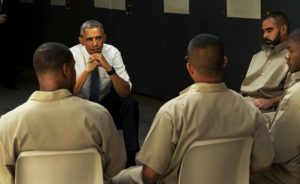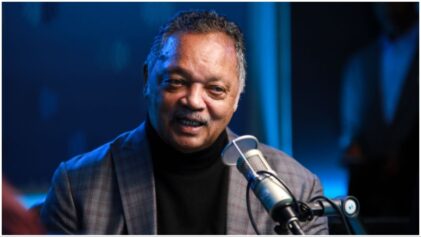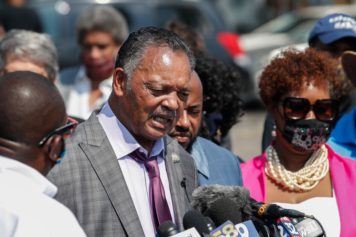
President Barack Obama meeting with inmates at El Reno federal prison in Oklahoma on July 16, 2015. Courtesy of VICE Media.
In an interview on NPR, President Barack Obama says he has consistently spoken about race, but looking back on his record, that doesn’t seem to be the case. Black critics of Obama have said he has often been silent on race issues and only recently found his voice.
Some of the criticism of Obama from Black activists has been quite pointed. Veteran civil rights activist Jesse Jackson told The International Business Times, Obama had “failed” Black people.
“He (Obama) has the view that racial injustice is something that requires a vote [in Congress],” Jackson said. “Blacks are without a targeted plan. Without one, we’ll never have an even playing field.”
One of Obama’s fiercest critics is Dr. Cornel West. West, who was recently arrested for protesting in Ferguson, Missouri, has called the president a “black mascot of Wall Street oligarchs and a black puppet of corporate plutocrats.”
According to The Washington Post, West publicly berated Obama after he gave a speech at the National Urban League centennial conference in 2010.
Obama told NPR’s Morning Edition, that his early years were consumed with dealing with pressing economic issues, such as the collapse of the housing market, the banking crisis and the global recession. Obama said he had wanted to address drug sentencing early in his administration.
“I had a conversation with [former Attorney General] Eric Holder when I came into office … about how could we address the issue of these ridiculous mandatory minimum sentences for nonviolent drug offenses that are filling up our jails, and we did a whole bunch of work without getting a lot of attention, with U.S. attorneys around the country changing incentives so that they didn’t feel as if being a good prosecutor meant always slapping the longest sentence on people,” Obama said. “And, in part because of some of those changes in practices, we saw, last year, for the first time in 40 years, a drop in both the number of people incarcerated and the crime rate.”
Political analysts have suggested that as Obama enters the final two years of his administration, and the end of his political career, he is becoming bolder on racial issues.
“After securing a second term, Mr. Obama appeared more emboldened,” said New York Times writer Peter Baker. “Just a month after his 2013 inauguration, he talked passionately about opportunity and race with a group of teenage boys in Chicago, a moment aides point to as perhaps the first time he had spoken about these issues in such a personal, powerful way as president. A few months later, he publicly lamented the death of Trayvon Martin, a black Florida teenager, saying that ‘could have been me 35 years ago.’”
In the early years of his first term, Obama struck a conciliatory note and tried to reach across the aisle and work with Republicans. However, he briefly touched on race when he criticized police for arresting Harvard professor Henry Louis Gates in his own home. Obama was lambasted by the right-wing media. Now he seems to have realized he will never win over certain segments of the country and is talking frankly about racial issues. At this stage, he has nothing to lose.
“While his first term was consumed with the economy, war and health care, his second keeps coming back to the societal divide that was not bridged by his election,” according to The New York Times. “A president who eschewed focusing on race now seems to have found his voice again as he thinks about how to use his remaining time in office and beyond.”
Obama said after six years in office, he has mastered the art of successfully juggling several issues at once.
“So here’s one thing I will say, is that I feel a great urgency to get as much done as possible, and there’s no doubt that, after over six and a half years on this job, I probably have an easier time juggling a lot of different issues, and it may be that my passions show a little bit more, just because I’ve been around this track now for a while …” Obama told NPR.
The New York Times said one of Obama’s legacies will be the My Brother’s Keepers initiative, which provides mentoring opportunities for at-risk youths.
“Staked by more than $80 million in commitments from corporations and other donors, the new group, My Brother’s Keeper Alliance, will in effect provide the nucleus for Mr. Obama’s post-presidency, which will begin in January 2017,” reported The New York Times.


